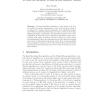105
Voted
ASIACRYPT
2000
Springer
15 years 5 months ago
2000
Springer
A potentially serious problem with current digital signature schemes is that their underlying hard problems from number theory may be solved by an innovative technique or a new gen...
105
click to vote
ASIACRYPT
2000
Springer
15 years 5 months ago
2000
Springer
Abstract. In this work we investigate the difficulty of the discrete logarithm problem in class groups of imaginary quadratic orders. In particular, we discuss several strategies t...
ASIACRYPT
2000
Springer
15 years 5 months ago
2000
Springer
In this paper, we investigate the gap between auxiliary-input zero-knowledge (AIZK) and blackbox-simulation zero-knowledge (BSZK). It is an interesting open problem whether or not ...
ASIACRYPT
2000
Springer
15 years 5 months ago
2000
Springer
Abstract. We introduce weaker models for non-interactive zero knowledge, in which the dealer is not restricted to deal a truly random string and may also have access to the input t...
105
click to vote
ASIACRYPT
2000
Springer
15 years 5 months ago
2000
Springer
Abstract. A t out of n threshold scheme is such that shares are distributed to n participants so that any set of t participants can compute the secret, whereas any set of less than...
ASIACRYPT
2000
Springer
15 years 5 months ago
2000
Springer
Abstract. In 1985 Fell and Diffie proposed constructing trapdoor functions with multivariate equations [11]. They used several sequentially solved stages. Another idea of building ...
ASIACRYPT
2000
Springer
15 years 5 months ago
2000
Springer
Abstract. We introduce an efficient method for performing computation on encrypted data, allowing addition of ElGamal encrypted plaintexts. We demonstrate a solution that is robust...
ASIACRYPT
2000
Springer
15 years 5 months ago
2000
Springer
ASIACRYPT
2000
Springer
15 years 5 months ago
2000
Springer
In a recent Stanford Law Review article, Ayres and Bulow [1] propose a radical anonymity-based solution to disrupt the “market” for monetary influence in political campaigns. ...
ASIACRYPT
2000
Springer
15 years 5 months ago
2000
Springer
A discrete-logarithm algorithm is called generic if it does not exploit the specific representation of the cyclic group for which it is supposed to compute discrete logarithms. Su...

